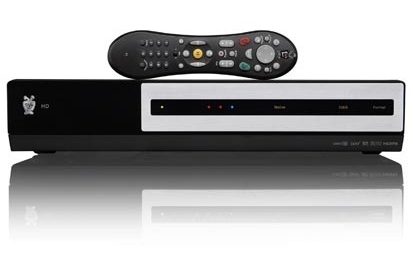TiVo Killed the Video Star
The television industry is getting increasingly nervous about the affects of TiVo and other DVR devices.
[T]he one piece of technology that has altered the TV landscape more than any other was not mentioned by any executive at any of the upfronts: the digital video recorder or DVR. More and more couch potatoes are using TiVo (Research) or cable boxes with DVRs built in to watch shows when they want and fast forward through the commercials. And even though TV ratings tracker Nielsen Media Research now has separate rankings for so-called “time-shifted” viewing of shows, advertisers appear to be wary of these figures because they know that many DVR viewers probably skip ads.
“Nobody wanted to bring up the DVR because none of the networks are sure on the issue. You cannot enter into an agreement where you tell your advertiser to pay for DVR eyeballs without accounting for people that are fast forwarding through commercials,” said one media buyer who asked not to be named.
The media buyer added that despite the buzz about how marketers can reach more viewers through new technology, he thinks the networks are still experimenting and that advertisers will be cautious as a result. “After going to the upfronts, I’m completely sickened by technology. The networks are being totally reckless and are all trying to do much to grab land. They are literally throwing spaghetti on the wall to see what sticks,” the buyer said.
Indeed, after having had TiVo the last three years or so, I can barely stand to watch ads in the few instances where I’m not time shifting. That’s true of radio as well, especially since I have Sirius. I’d rather risk missing part of the programming than sit through commercials, so the moment an ad comes on, I’m flipping through my presets.




Wouldn’t it be nice if TiVo made political ads on TV obsolete?
This is why the networks are experimenting more with programs that can be streamed via the internet. This way, they can still force the computer viewers to sit through commercials. Maybe someday the networks will go to a complete internet distribution model to avoid the TiVo phenomena.
GE has a commercial with GE one second theater built in. You need TiVo to see it. The ad with the dancing elephant has one second theater at about second 27. you pause it, then do frame advance. There’s information about the “actors” in the commercials. The elephant’s previous “peanut problem”, a small scandal involving the flamingos and a bit on the gecko (he used to do a show dressed as a frog). This is an interesting use of TiVo technology.
1 second theater
I think this may be a case of the railroads not being in the railroad business but rather the transportation business. Sometimes technology moves some underlying assumptions about a business.
The networks are in the entertainment business, not the ad in between the entertainment business. I suspect you will see more product placement inside the show (e.g. the hero drinks coke) or the networks will recognize that what people would really like is to spend their money on what they want to watch (aka pay per view, potentially delivered over the internet).
At a national association of broadcasters convention recently, a couple of broadcast group representatives said that in 10 to 20 years radio as we know it would be gone. That the clear channels and the like would be content providers (probably over the internet), not broadcasters. When asked what would distinguish a clear channel from a 17 year old kid with a good ear for music putting out a play list from his home computer, they sort of turned green and didn’t have an answer. The same may happen via TV, except the production capabilities are much higher.
I too have Sirius, and now I cannot stand to listen to commercial radio anymore. the commercials are so jarring, and so continuous it makes it impossible for me to enjoy the music (when they get around to playing music, that is).
The simple fact of the matter is – nobody likes commercials. some people will avoid them when possible, but most people just ignore them. So the ad agencies make them more and more obnoxiously attention-grabbing, or less and less like ads (fake news, etc.).
I’m constantly amazed at spamming companies that go to great lengths (and expense, and sometimes legal risk) to ‘beat’ spam filters. I understand the adage that even one out of some huge number in responses pays for the campaign, but that assumes all targets are equally likely to respond. If I’ve gone out of my way to actively avoid your advertising, I’m that much less likely to fall for it if you force it down my throat – those spammers are spending more and more money for lower and lower return rates…
You have Sirius, I have XM. But it’s the same concept. Corporate FM radio sucks. I love the choice of music and the noncommercial channels. Commercial over the air radio will be dead sooner or later.
Legion,
Actually there is some conventional wisdom in marketing that the people you want to hit are those who try to avoid you. It goes like this. Some of the avoiders will be doing it because they really hate the spam and you will just make them mad if you get through. Who cares. They will never love the advertiser anyway.
But some are because they are suckers for the ‘hook’, the advertised shiny thing that draws their attention. They have low self control to resist the sales pitch. So they try to resist the lure by hiding behind their spam blocker. Those have a higher than normal chance of responding if you get past their defenses.
This is a variation of the door to door salesmen who would find the “no solicitation” signs especially attractive for the same reason.